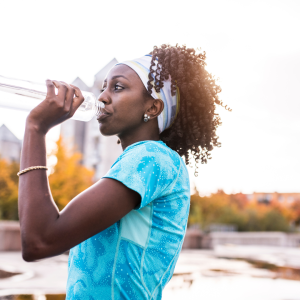Summer Hydration Tips: Pick Drinks To Quench Thirst for Good Health

Summer is here, which means warmer weather, lots of outdoor physical activity and a risk of electrolyte imbalance. It is important to pay attention to body hydration especially in the summer months.
“Water is always going to be the best choice for staying hydrated because it gives your body fluid without added calories, sugar or caffeine, but other foods and beverages can help you meet your daily fluid needs too,” said Erin Zepp, a dietitian and culinary medicine coordinator with Memorial Wellness Center.
How much fluid do you need?
- 2 ½ quarts (10 cups) daily for the average adult. That’s just to keep the body running smoothly and to replace fluids lost throughout the day.
- If you lose more water through heavy perspiration, you’ll need even more fluids. Drink water and other beverages, and remember – you can also get water from fruits and vegetables.
Zepp offers tips about these popular beverage choices:
Water
Water is calorie-free, easily absorbed, highly accessible, and can help keep your appetite in check. Try it colder or add a squirt of lemon or lime juice for a boost of flavor. If you’re highly active, sports drinks are an option to help your body absorb more water and replace electrolytes. Remember: sports drinks also include calories.
“Most people’s tap water or the water found at drinking fountains is safe and economical, but some people don’t like plain water,” Zepp said. “You can use flavoring agents in your water like Crystal Light packets or drops of MiO water enhancers. Be cautious of any bottled waters that promise to deliver ‘energy’ because these often also contain caffeine.”

Coffee and tea
Coffee and tea can help you reach your fluid amounts, but caffeine in these drinks has a mild diuretic effect. Drinking some coffee or tea won’t cause you to be dehydrated, but don’t rely on these beverages as your primary fluid choices. Go decaf to cut back on caffeine. General guidelines suggest about 200-300 milligrams of caffeine per day or two to three cups of coffee. Tea contains about 40 milligrams of caffeine per cup. Don’t forget gourmet coffee and tea drinks can also deliver plenty of calories from sugar and milk.
100% fruit juices
100% fruit juices supply water in addition to vitamins A and C (and some other phytonutrients depending on the juice). Fruit juices may be thirst-quenching, but calories add up. An 8-ounce glass of apple juice comes with about 110 calories. Try diluting fruit juice with water or seltzer. Although 100% fruit juice counts as a fruit group choice, guidelines suggest no more than one serving (one cup) of fruit per day from juice. Juice drinks, juice cocktails or juice beverages usually contain only a small amount of fruit juice along with added flavors and sugar.
Milk and soy milk
- Milk delivers calcium and other important nutrients in addition to water.
- Soy milk is a nutritious non-dairy option, but be sure to look for a product fortified with calcium.
- Fat and calorie content may vary with different types of milk, but the contributions of nutrients and water are about the same.
- Flavored milk typically contains about 40-60 calories more per 8-ounce cup than an unflavored option.
- Guidelines suggest getting three cups each day from the milk group, which also includes yogurt and cheese.
- Plant-based milks (almond, cashew, oat) are often fortified with calcium and vitamin D, but lack the protein that comes with cow’s milk. These choices can be full of sugar, so choose unsweetened whenever you can.
Soft drinks
Soft drinks may offer fluid (about 90% water), but they also supply loads of calories, perhaps caffeine and no nutrients. Diet soft drinks are an option (99% water), but again these drinks supply no nutrients and may deliver more caffeine than you need. Excessive soft drink intake is also associated with decreased bone mineral density.
Alcoholic beverages
Alcoholic beverages really don’t count toward your fluid intake because alcohol’s diuretic effect makes your body lose water. For many reasons, moderation is advised for drinking alcoholic beverages. This means up to one drink per day for women and up to two drinks per day for men. Some people, such as those on medications that can interact with alcohol (some diabetes medications), should not drink any alcohol. Although some research suggests that drinking a small amount of alcohol may lower risk for heart disease, that isn’t a reason to start drinking or to drink more frequently.
Related
No Magic Pill: Five Areas to Tackle with Memorial Wellness Center
20 Years after Bariatric Surgery